Reaching Milestones One Step at a Time
Your Child's Growth
is Our Mission
Welcome to Special Scholars Early Intervention, a go-to resource for families of children with special needs. We are dedicated to providing Early Intervention Program (EIP) services for children from birth to three years of age who have or are suspected of having a developmental delay and/or disability.
Our mission is to work alongside families every step of the way, giving them the resources and support they need to help their children achieve milestones. Together, we can make a difference!
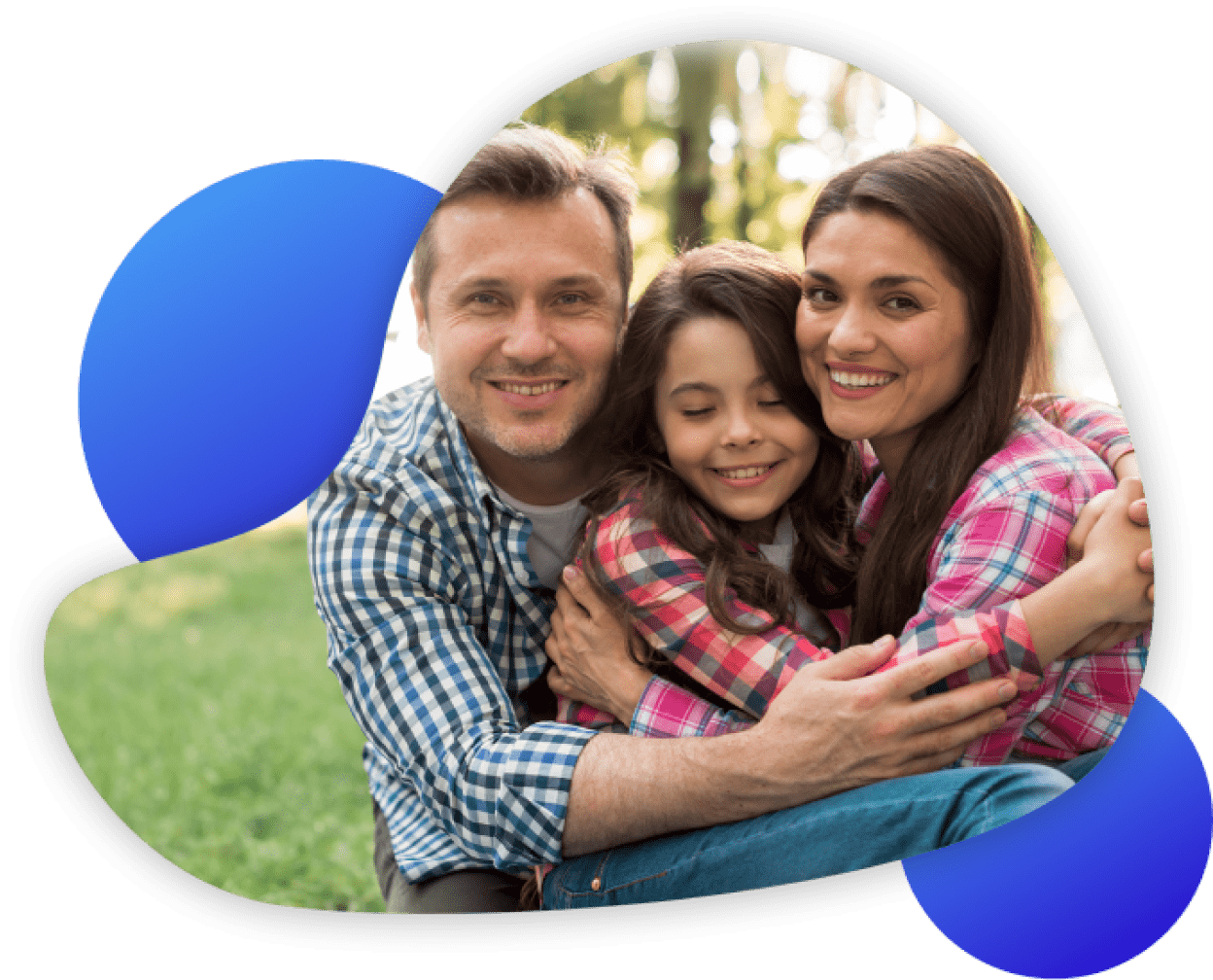
What we do
Early Intervention Program is a public program for children with special needs, servicing children from birth until the age of three. At Special Scholars Early Intervention, we believe that every child deserves the best possible start in life. We understand the vital role that parents and families play in their child’s development and work collaboratively to support children in reaching every milestone, through a range of home and community-based services.
Research shows that the first few years of a child’s life are critical for their overall development. That’s why we focus on providing stimulating and educational training for children from birth to three years old. Our thorough approach is designed to promote growth in all 5 primary developmental domains of Early Intervention: cognitive; social-emotional; physical; communication and language; and self-help/adaptive skills. We work closely with a team of therapists (SI/ABA, SLP, OT, PT), service coordinators and other healthcare providers to ensure that children receive comprehensive and coordinated care.
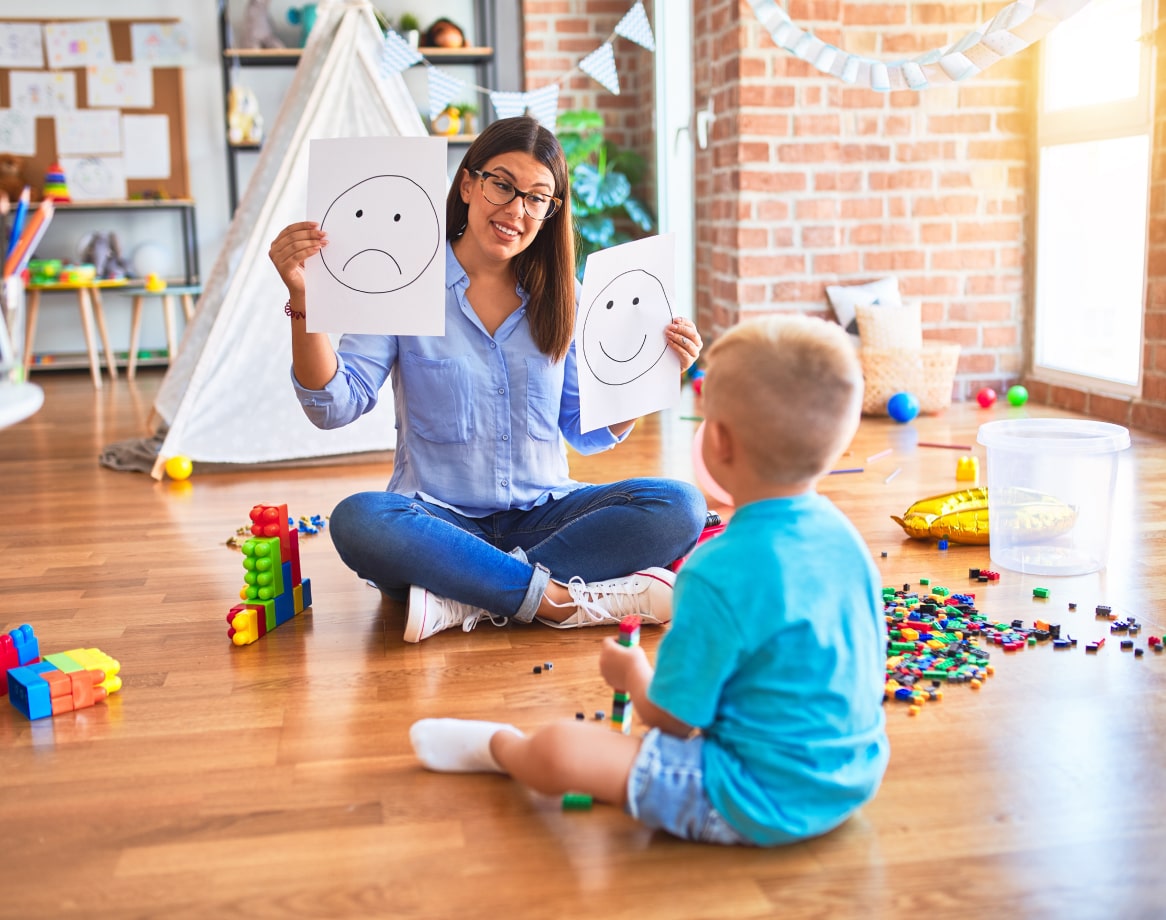

Integral to our approach is the concept of family engagement. Special Scholars Early Intervention aims to provide a seamless, collaborative experience for families who are navigating the complexities of early childhood development, reducing the burden on parents and empowering them to make informed decisions about their children’s care.
We believe that the family is a vital component of the child’s developmental process and, as such, should be active partners in their care. To facilitate this, we use Embedded Coaching and Collaborative Coaching strategies, wherein therapists work closely with families, equipping them with the knowledge and techniques needed to support their children outside of therapy sessions. The purpose of this coaching is to enable families to work effectively with their children during everyday activities, turning routine moments into opportunities for growth and development. Our goal is to weave therapeutic techniques seamlessly into a child’s routine, promoting their development in a way that feels natural and non-intrusive.
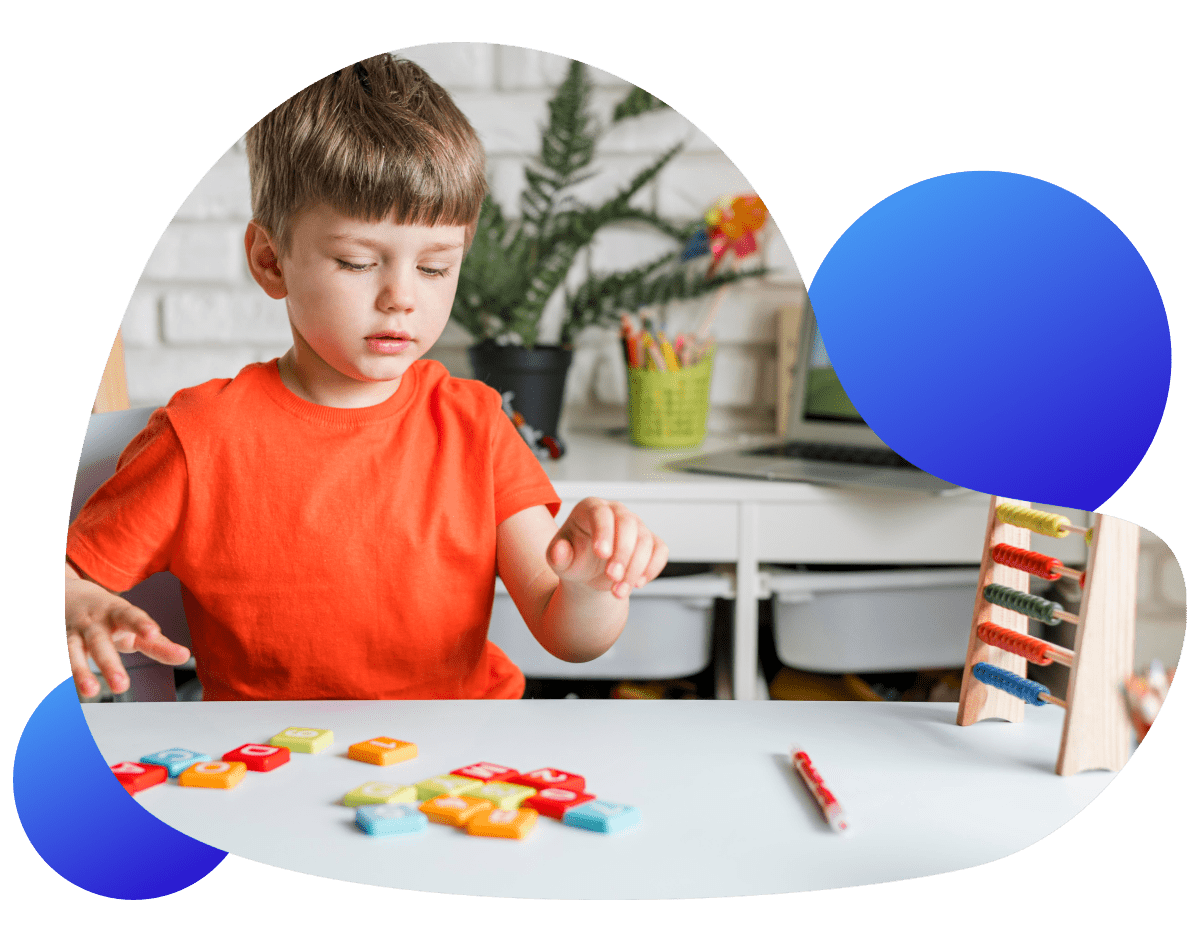
- By fostering a robust partnership between families and therapists, we aim to expand the effectiveness of therapeutic interventions beyond scheduled sessions. In doing so, we enhance families' capacity to support their children's learning and development.
- Special Scholars Early Intervention is dedicated to achieving the key federal outcomes of the Early Intervention Program, using Embedded Coaching as a tool to empower families and bolster children's developmental progress.
- Our program emphasizes an inclusive, multicultural approach, respecting and valuing the diverse backgrounds of our families. We understand that each family brings a unique set of cultural experiences, beliefs, and traditions that fundamentally influence their perceptions and approaches to their child's development.
- Our multicultural team ensures that our approach aligns well with a family's unique cultural context, thereby improving the acceptance, relevance, and effectiveness of the strategies we recommend, ensuring every family feels seen, heard, and respected within our program.
Special Scholars Early Intervention Program is approved, regulated, and funded by the NYS Department Of Health and the NYC Department Of Health & Mental Hygiene to provide the following early intervention services
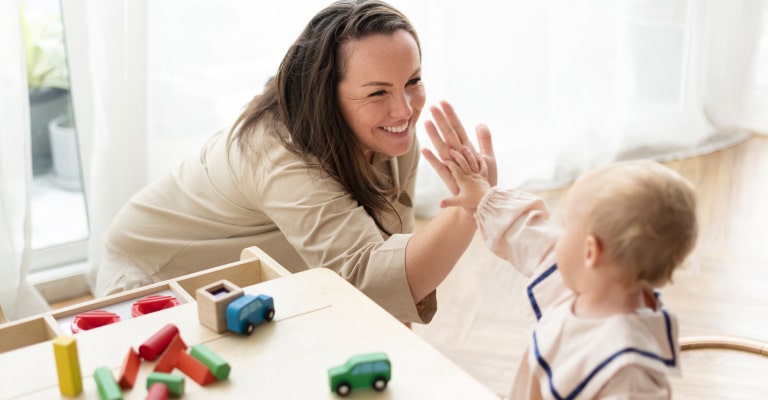
Developmental Assessments
Through comprehensive assessments, we are able to identify children's strengths and potential developmental concerns. This aids in pinpointing areas that need growth and improvement.
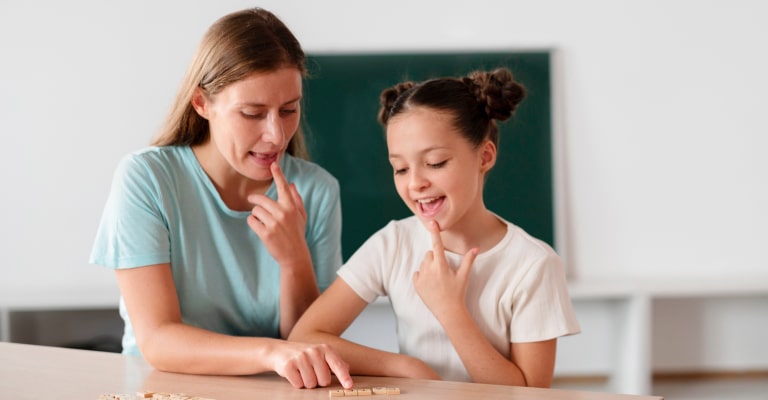
Therapy Services
At Special Scholars Early Intervention, we provide specialised therapy services tailored to each child. Our goal is to bolster their development and efficiently guide them in reaching crucial life milestones.
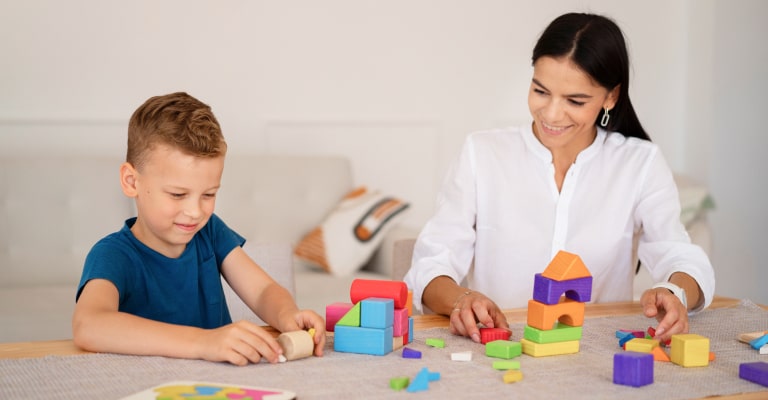
Applied Behavioral Analysis (ABA)
Through structured ABA sessions, we focus on developing essential skills such as communication, social interactions, and adaptive behaviors through a variety of techniques.

Parent Education and Support
The parent education classes, and one-on-one guidance are designed to equip parents with the knowledge and tools needed to effectively foster their child's development. Our ultimate goal is to create a supportive and understanding community for the development of each child.
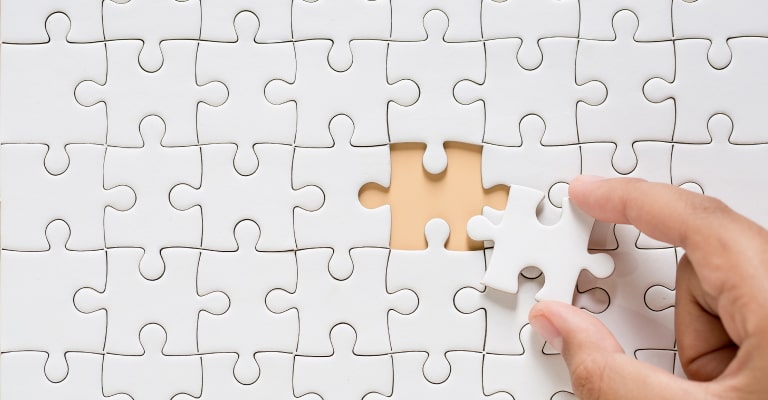
Special Instruction
The goal of Special Instructors is to increase children’s learning opportunities to positively impact their development. The special instructor works closely with parents and families, so that these experiences can extend and become embedded throughout the child’s daily routine.
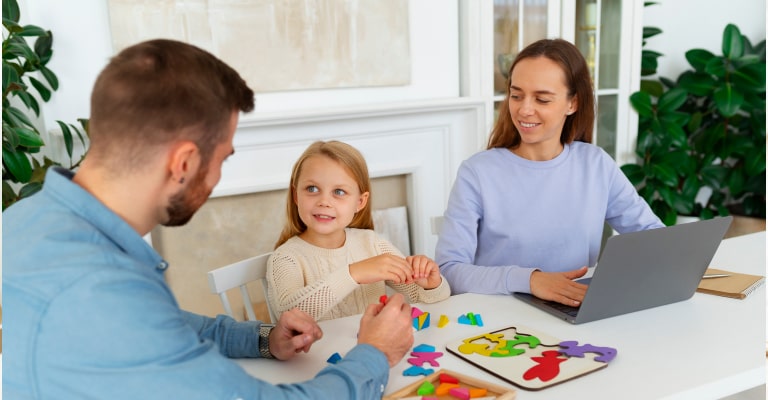
Related Services
Our Early Intervention Program encompasses a broad range of additional services, including Speech/Language Pathology, Occupational Therapy, and Physical Therapy. Each of these specialized areas are carefully designed to promote the development and learning abilities of our young participants.
Helping Children Thrive: Early Intervention Benefits
Our community-based services are designed to help children with developmental delays or disabilities overcome obstacles and reach their milestones. By intervening early, we can help children develop the skills they need to thrive in school, social settings, and beyond.
Support
The assistance we offer to families is among the most advantageous aspects of our services. Our team of professionals collaborates directly with families and NYC Early Intervention Official Designees to create programs tailored to the specific needs of each child, and we offer continuing support and direction throughout the process.
Noteworthy steps
Addressing developmental delays at the earliest possible stage is crucial to our mission. Our proactive approach enables us to guide children in reaching important developmental milestones. This holistic focus ensures children develop a robust foundation for their future growth and learning, leading to improved outcomes.
Enhanced Academic Performance
Early Intervention plays a significant role in assisting children to develop crucial cognitive skills that will serve as building blocks for their future. These skills include attention, memory, and problem-solving abilities. By fostering these skills early on, we can enhance their ability to learn, understand, and navigate the world around them.
Parental assurance
Our EIP is dedicated to providing families with the necessary tools and resources to support their child's development effectively. We focus not only on the child, but also on strengthening family resilience. By doing so, we aim to instill a sense of confidence in parents' abilities to nurture their child's growth.
Wide range of Services
Special Scholars Early Intervention offers a large range of services to meet the individual needs of each child. From speech and language therapy to physical therapy, occupational therapy, and more, our comprehensive services are designed to help children achieve their developmental milestones.
Highly Skilled Professionals
Our dedicated team comprises of highly experienced ABA (Applied Behavioral Analysis) Therapists. They specialize in providing Special Instruction (SI), a unique form of support designed to address individual needs of each child. Their expertise in ABA and SI aids in fostering optimal development and behavioral outcomes.
A Closer Look at Your Child's Growth:
Understanding Developmental Milestones
We understand that as parents, you may be intrigued by our program and wondering whether your child is eligible or if these services are even necessary. That's why we believe it's invaluable to shed light on Developmental Milestones. These milestones offer a benchmark, giving you an idea of what children typically accomplish by a particular age. This way, you can assess whether your child might need a little extra support in any specific area or skill. Observing your little one as they play, learn, speak, interact, and move is like opening a window into their world of development. To get a snapshot of your child's development at various ages, consider the following checklist.
This is what most children can typically do by this age:
At two months old, a baby's social, emotional, cognitive, and physical abilities are beginning to show growth and expansion. For instance:
Social/Emotional Milestones:
- These include not just signs of self-soothing, but your baby is also starting to build a bond with you, their parent or primary caregiver.
- They now recognize your face and show clear delight when you're around. This emotional bonding is the foundation of social development.
- Look out for their first smile in response to your interaction - this is an important social milestone.
Language/Communication Milestones:
- An introduction of sounds beyond crying – this might include cooing and gurgling sounds, displaying an early interest in communication.
- You might notice your baby turning their head in response to loud sounds, indicating their growing awareness of auditory stimuli.
Cognitive Milestones:
- At this age, your baby is starting to develop the ability to follow movement visually.
- They are becoming more aware of their surroundings and can maintain focus on a toy or object for a brief period.
- You may notice them tracking your movement across a room, a sign that their cognitive abilities are improving.
Physical Development Milestones:
- They now have more control over their movements, demonstrated by their ability to hold up their head during tummy time.
- They may start opening and closing their fists and may start moving both arms and legs in a more coordinated fashion.
As your baby reaches 4 months old, their world becomes more interactive and expressive. Here are some expanded details.
Social/Emotional Milestones:
- Your baby becomes more adept at attracting your attention with smiles and laughter. This interaction reveals their increasing emotional intelligence and growing social awareness.
- They're beginning to connect certain sounds and movements with positive responses from you, hence they might chuckle when you try to amuse them.
Language/Communication Milestones:
- Your baby is starting to experiment with sounds – they may now produce elongated vowel sounds such as “oooo” and “aahh”.
- Their communication is now more of a two-way street – they may even respond to your voice or react to the sound of familiar voices.
Cognitive Milestones:
- Your baby's cognitive development takes a leap at this stage – they now look at their own hands with curiosity and are starting to understand cause and effect. For instance, they might open their mouth in anticipation of a meal when they see their bottle or when it's their usual feeding time.
Physical Development Milestones:
- Your baby can now hold their head steady without support, showing increasing muscle control.
- You might also notice them using their arm to swing at dangling objects and pushing up onto their elbows during tummy time.
Your baby at 6 months old is becoming more engaged with their surroundings. Here are more detailed observations:
Social/Emotional Milestones:
- Now, your baby is beginning to recognize familiar faces and shows curiosity by looking at themselves in a mirror.
- They express emotions more noticeably, often responding with laughter to amusing interactions.
- They are starting to understand their identity and how they fit into their surroundings.
Language/Communication Milestones:
- Your baby engages in sound exchanges with you, making noises like "raspberries" and squeals. This interaction forms the foundation of their future language development.
- Their comprehension of speech is also evolving; they're beginning to understand the basic tones of communication.
Cognitive Milestones:
- Your baby now explores their world more actively, often using their mouth.
- They reach out to grab toys and objects they desire, showing improved hand-eye coordination.
- They're also able to communicate basic needs, like when they've had enough to eat.
Physical Development Milestones:
- They may roll from their tummy to their back, and lean on their hands for support while sitting.
- They might also begin pushing up with straight arms during tummy time, showing improved strength and coordination.
At nine months old, your baby's social and emotional development is becoming more nuanced. Here's what you might observe:
Social/Emotional Milestones:
- Your baby is likely to show caution around strangers, and display various facial expressions that reflect their mood.
- Their understanding of object permanence is developing, hence they may react when you leave the room.
- Their interaction with you becomes more playful as they now enjoy games like peek-a-boo.
Language/Communication Milestones:
- Your baby's sounds are now evolving to include repetitive syllables like "mamamama" or "bababababa".
- They're becoming more adept at communicating non-verbally too, like raising their arms when they want to be picked up.
Cognitive Milestones:
- Your baby is beginning to understand cause and effect.
- They may look for objects that have been hidden or dropped out of sight, displaying their emerging problem-solving skills.
- They are also fascinated by the noise produced when banging two things together.
Physical Development Milestones:
- At this age, babies typically develop the ability to sit up by themselves without support.
- They can transfer items between their hands, and use their fingers to explore their surroundings or move food towards their mouths.
Your child's world at one is full of exploration, expression, and lots of play. Here's what most one-year-olds are typically doing:
Social/Emotional Milestones:
- Your one-year-old will increasingly engage in playful games such as pat-a-cake, demonstrating their enjoyment in interactive activities.
- They are developing a better understanding of social cues, as well as beginning to show preferences for certain people and toys.
- They may cry when you leave, showing a deeper attachment to you, and also imitate actions they observe in their environment.
Language/Communication Milestones:
- In addition to waving "bye-bye," your child is beginning to verbally recognize you, calling you "mama" or "dada".
- They respond to simple verbal requests and have started to use exclamations like "oh-oh!"
- They might also attempt to imitate sounds or words, paying more attention to the speech of others around them.
Cognitive Milestones:
- Your child is now exploring objects in many ways, like shaking, banging, throwing, or dropping them.
- Their curiosity is growing, as evidenced by their eagerness to find things hidden, like a toy under a blanket.
- They enjoy inserting things into containers and have started to use objects appropriately, such as drinking from a cup.
Physical Development Milestones:
- They can get into a sitting position without assistance and crawl forward on their belly.
- They have started to pull themselves up to stand, often taking support from nearby furniture.
- They may even walk a few steps without support.
- Fine motor skills are also improving, as demonstrated by their use of the pincer grasp (thumb and index finger) to pick things up, like tiny bits of food.
By the age of 15 months, your toddler's world is becoming a whirlwind of imitation and discovery. Here's what most fifteen-month-olds are typically doing:
Social/Emotional Milestones:
- Your child will begin to copy others during play, showing a growing understanding of social interaction.
- They express excitement through physical actions like clapping and display affection towards familiar people and favorite toys.
Language/Communication Milestones:
- Apart from "mama" and "dada," they will attempt to articulate a few more words.
- They recognize and point out familiar objects when named, and can also follow simple gestures and verbal commands.
Cognitive Milestones:
- Your child shows growing cognitive abilities by trying to use objects appropriately, like a cup or a book.
- They demonstrate an understanding of balance and proportion by managing to stack at least two small objects like blocks.
Physical Development Milestones:
- Your child might start to take a few independent steps, showing increasing confidence and coordination.
- They'll continue to develop fine motor skills, such as feeding themselves small bits of food using their fingers.
By the age of 18 months, your toddler's world is becoming more independent and interactive. Here's what most eighteen-month-olds are typically doing:
Social/Emotional Milestones:
- Your child will start to become more independent, venturing away from you but frequently checking to ensure you're still close.
- They show a growing interest in shared activities, such as looking at a book together or participating in routine tasks like washing hands.
Language/Communication Milestones:
- They are likely to articulate three or more words and can follow simple verbal commands without gestures.
- They begin to show an understanding of communication beyond words by imitating sounds and gestures.
Cognitive Milestones:
- Your child is developing their problem-solving skills, copying your actions, like sweeping with a broom.
- They engage in simple play with toys, displaying an understanding of the appropriate use of toys such as pushing a toy car.
Physical Development Milestones:
- Your child can now walk without assistance and may try to use a spoon.
- Their climbing abilities are improving, and they may be able to get onto a couch or chair unaided.
At two, your child is becoming more aware of their surroundings and shows increased interaction. Here's what most two-year-olds typically accomplish:
Social/Emotional Milestones:
- Your two-year-old shows a growing sense of empathy, noticing when others are upset.
- They often look to your reaction in new situations, showing an awareness of social cues and reactions.
Language/Communication Milestones:
- They start saying at least two words together, like "More milk," and can point to body parts when asked.
- They are also more capable of understanding and following simple instructions, and may repeat words overheard in conversation.
Cognitive Milestones:
- Your child can manipulate objects in increasingly complex ways, such as holding a container in one hand while removing the lid with the other.
- They start exploring switches, knobs, or buttons on toys and enjoy engaging with multiple toys at once.
Physical Development Milestones:
- They can kick a ball, run, and walk up and down stairs with or without help.
- Fine motor skills are also improving, with your child starting to eat with a spoon.
Your child at three is becoming more independent and communicative. Here's what most three-year-olds can typically do:
Social/Emotional Milestones:
- Your three-year-old can calm down within 10 minutes after you leave, like at a childcare drop-off.
- They start noticing other children and may join them in play, showing increased social awareness and interaction.
Language/Communication Milestones:
- They start asking "who," "what," "where," or "why" questions, and can describe actions in pictures or books.
- They can also say their first name when asked and generally speak well enough for others to understand.
Cognitive Milestones:
- Your child is demonstrating more complex cognitive abilities.
- They can draw a circle when shown how to do so, and they are starting to understand the concept of safety, avoiding touching hot objects when warned.
Physical Development Milestones:
- Fine motor skills continue to improve, as evidenced by their ability to string large beads or macaroni together.
- They also start dressing themselves in some clothes and begin to use a fork.
Steps for Enrollment
Initiating the journey of Early Intervention in New York City can seem daunting, but we’re here to ensure it’s a smooth process. This special program, designed to support your child’s growth, is just a few steps away.
Feeling a bit overwhelmed by the process?
At Special Scholars, we can facilitate the referral on your behalf, directly through the New York Early Intervention System (NYEIS). This streamlined method ensures your application is processed more promptly and efficiently, making it an ideal option. Explore this opportunity, and take this important step toward a brighter future for your child. We’re with you at every stage of this journey.
Step 1
First and foremost, reach out to the city’s helpline by dialing 311. Simply request information about the Early Intervention Program.
Alternatively, you can initiate the referral process yourself by filling out a dedicated form – NYC Early Intervention Referral Form. Whether you’re a parent, a teacher, or a doctor, you’re qualified to complete this form.
Step 2
Once completed, the form needs to be faxed to the Early Intervention Program (EIP) Regional Office correlating with the child’s borough of residence.
Below, you’ll find the fax numbers for each borough:
Brooklyn: 347-396-8817
Manhattan: 212-436-0902
Queens: 718-553-3997
Staten Island: 718-568-2341
Bronx: 718-838-6862
We're here to listen, support, and guide you.
To initiate the enrollment process for the Early Intervention Program, please contact 311.
Special Scholars Early Intervention holds a contractual agreement with the New York State Department of Health, Bureau Of Early Intervention, to administer Early Intervention (EI) services. Our program is authorized, regulated, and financially supported by both the New York State Department of Health and the New York City Department Of Health & Mental Hygiene. The Early Intervention Program (EIP) is a publicly-funded initiative aimed at providing support to children under the age of 3 who either show signs of developmental delays or are at risk of experiencing disabilities. Determination of eligibility for EIP can only be made by evaluators approved by the state and working under a contractual arrangement. All necessary ei services for eligible children are identified in collaboration with the parent and require authorization from the designated official at the NYC Early Intervention Office. The service coordinator will facilitate the arrangement of service providers, taking into account the unique needs of the child and family, as authorized by the NYC Early Intervention Office. Upon request, EI services can be provided at childcare facilities or other community locations. However, it is the responsibility of parents to cover any associated fees when availing services at these locations. It’s important to note that all EIP services are provided to parents free of charge, although health insurance may be utilized to cover approved services.
Early Intervention is proven to have a positive impact!